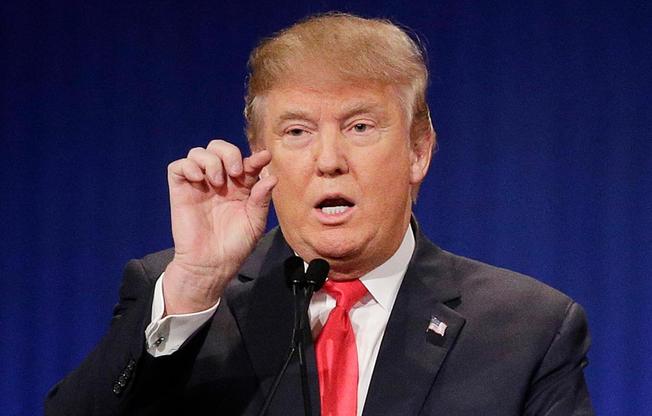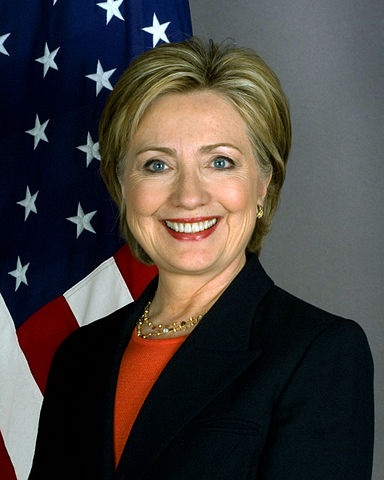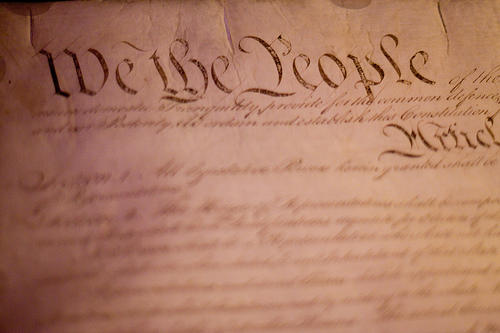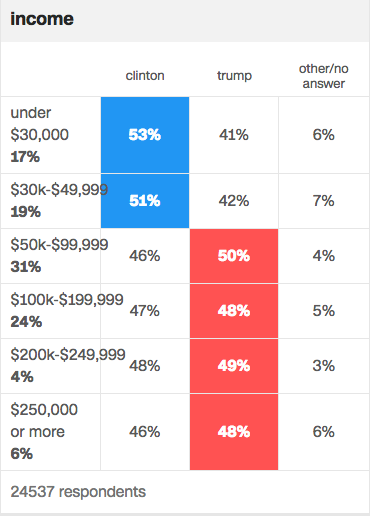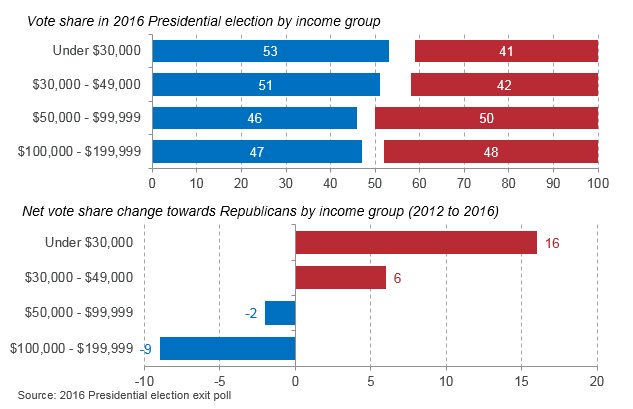(This article is by Stirling Newberry)
The election was not stolen, but it was massaged. A majority of the voters in the United States preferred Hillary Clinton over Donald Trump, but that is not the way the election was decided. If we, the people, of the United States want a different system, then there are steps to get one. First we have to look back at the election of 2016, and see the many different avenues that converged to allow Donald Trump, who clearly did not win the majority of votes, to nevertheless claim the presidency. Again these are not suppositions, but facts that have two be dealt with, or in the future they will be used the same way to get a minority president. Remember that several times this has happened, and in some cases a good president has won out; for example, Lincoln won with only 40 percent of the vote.
It is also not the case that Trump was the only factor; this is why it is a constitutional crisis, but one that the elites can ignore, because they have the wherewithal to weather the storms, whereas a large number of the populace does not. In Rome, they called the elites “patricians,” and the populace were called “ plebes,” and it may be useful to recognize that in American society we are not that much different from Rome, but that there are important distinctions. Or as Orwell once wrote, “All animals are equal, but some are more equal than others.”
The Division of the People
In a democratic government, all votes should be equal. Thus, the first step towards making an undemocratic government is to divide the people, so that the vast majority of them do not really have an effective vote. This is true for the majority of people in the United States–so much so, that it is part of the primer on presidential elections. A Democrat in Wyoming or a Republican in New York might as well stay at home, for all the good their presidential vote means. It will be counted, but it does not mean anything. It is, for all intents and purposes, a wasted vote.
What matters is that there are more wasted votes on one side than the other, and again, this is part of the system; states, not people, decide an election. In 1787, the states–not the people–were the ultimate arbiters of the presidency (this was modified by the 12th amendment, but still had the same thrust). This has remained true even though we would like to think that the people elect the president. And in most cases they do, but there are exceptions.
In the five times a popular vote winner has lost the presidency to another, the first time, in 1824, was different. In that election, no candidate attained a majority of the vote. Jackson won a plurality of the electoral college, and was also the winner of the vote, but it was John Quincy Adams who took the presidency, because if no one had won the presidency through the popular vote, the election was thrown into the house of representatives, which voted by state. The other four times however, 1876, 1888, 2000, and 2016, the situation was much clearer. While the winner of the popular vote may not have commanded a majority, in each of those elections, the president-elect commanded more than the winner of the electoral vote system.
In fact, in 1876, there was a case of the presidential vote being “massaged.” On election day, the polls opened, and when they closed, Democrat, Samuel J. Tilden seemed to be elected president. But a single man looked at the results differently. That man is Daniel Sickles, and he is now no more than a forgotten footnote. But at the time, through sheer force of will, he pushed the 1876 election to a crisis point.
While there are many versions of this story, the upshot was that the election was not decided by constitutional means. The result of this constitutional crisis resulted in the passing of a law which would decide the presidential election. The law formed a 15 man committee, and that committee decided eight to seven in favor of the Republican, Rutherford Hayes, as the winner of all 20 disputed electoral votes. In reality, several of the states’ votes would not be treated “fairly” as we would define it, in that several decisions were made by an elected official, who somehow managed to make a decision which was in accordance with their party. Eventually, this incident heralded the end of the Reconstruction Period (the period during which Southern Confederate states were brought back into the Republican union).
In the past, there have been constitutional crisis points, this is not the first. But while these crisis points can happen, they require a spark – both a running spark and an ignition. Or to put it another way, there is an argument between the people deciding the Presidency, and the states deciding the presidency.
And 2016 is such a point.
The Deep Background
First, an election like in 2016 does not occur in a vacuum. The election of 2000 also featured an indecisive result. The important thing to remember is that if the result is thrown to the House of Representatives, the inevitable result is a Republican victory. This is because the result is not based on “one representative equals one vote,” but one state equals one vote. That is to say, Alaska has the same weight as California. Thus, the pressure on the Democratic Party must be that the election was decided by the popular vote, or George W. Bush would win any contest in the House of Representatives.
But there was a hidden feature: The Republicans had rigged the vote through a variety of means, and they knew how it was done. But the Democrats did not have this information, so they had to guess which votes in Florida needed to be recounted, and they guessed wrong. The result was decided in the US Supreme Court as Bush v. Gore. While the people thought that the election was theirs to decide, in actuality it was between the Democratic presidential candidate and the Republican presidential candidate. The difference is that if the election was the People’s to decide, every length to correctly determine the winner would have been pursued. As in this case, it was a struggle between the two presidential candidates, thus, there is an agreement, and that agreement will be rubber stamped by Congress. The agreement, though never put in to words, was that the Democrats would have one chance to contest the election in Florida, and no more than that.
Gore thought that counting the “undervotes” would be enough. But in fact there were three sets of problems with the ballots. The first was that Florida was run by Republicans, and officers of the Republican party would often go into a county election board, and would fill out Republican voters absentee ballots. In one case, some 5000 of these ballots were submitted. The problem with this from the Democratic party, is that these votes were all legitimate, and one could say that the Republican party was correcting the voting rolls. And this is true in so far as it goes, thus these votes were counted. The problem is that Democratic votes were not counted, and thus Democratic voters had no such help in getting their absentee ballots counted.
The next problem was with “undervotes.” These were ambiguous votes which could not be decided by machine. Much of the time, the voter had made a clear decision, but often it was the voting equipment was unable to determine what the decision was. In Florida, the “under votes” needed to be counted by hand. This gave rise to an additional problem: There were multiple kinds of voting equipment. So in one county, one vote would be registered, and in the next county over, one would not be recorded. The problem is, “How do you know?” and in many cases, it comes down to a point of diminishing returns. If a human vote counter cannot tell, then a vote should not be counted. When totaling up the human counted total, there is a slight difference from the machine-counted total. But this, alone, did not give Gore the additional votes that he needed. So under the elite agreement, the winner was Bush.
The final problem is with the “overvotes,” that is, a person wants to be sure that their vote was counted, and so not only did they punch the ticket for whichever candidate they selected, they also wrote it in. Again, the machine throws the battle out, however the law says that the vote should be counted if the name in the writing section is the same as the punch section. And this is important because, with overvotes and undervotes both counted, Gore would have won.
But the key factor is this: Who is deciding who wins the election? And the subterranean decision was that the two parties would decide the election, not the people.
However, this is not the end of story. Because at the end of his presidency, Bush basically wrecked the economy, not as in a recession, but The Great Recession. The problem was that the elites thought that it was up to them to decide, and the decision was 50-50, one would be acceptable whichever one the people chose. But that was not the case. Bush ruined the economy, and brought America into two wars which, while it did not lose, it was a struggle to see them to their conclusions. In other words, the elites picked Bush, and the elites were wrong. There was a difference between the two candidates, and it resembled catastrophe theory in its result.
The Big Sort
There was however a deeper problem. Americans were sorting themselves in to Democrats and Republicans. This was documented by a book: The Big Sort, by Bill Bishop. In this book, Bill Bishop lays out the way which the two parties sorted themselves, and how the Republicans came out the better for it. This means that any election could be the trigger–only an overwhelming Democratic surge keeps this in check. And in 2008 and 2012, this surge quieted the undercurrent of “the big sort.” The other problem is that before the sort, their were many more democratic counties which could be described as “landslides” and afterwards there were many times more Republican counties that could be described the same. This meant that the Democrats relied on a few large counties to offset the overwhelming majority of likely populated Republican counties.
This meant that in 2016, a problem emerged – a few razor thin Republican states, could overwhelm the popular preference for a Democratic candidate. Thus, Hillary Clinton is winning by some 1.43 million votes.
But “the big sort” is not the only problem, because on the ground level, the Republicans have twisted the election system so that many people who wanted to vote for Clinton, were purged from the rolls. This made a difference in the rust belt states. Again, legally they had the power to do this, but ethically it is questionable for one side to skew the results – because not only did Trump win the states, he won by a lot. Also remember, there is always the chance of cheating at the local level – after all the results are going to be enormous – and people who count the votes are often intertwined with their candidate. Again, this happens in most elections, it is just that with the Presidency of the United States, the consequences are tremendous.
Some examples of this can be seen from the number of polls in 2012 vs. 2016. One came to an 868 count in The Nation magazine. There were also purges of voters in key states, such as Michigan. Enough so that the result could quite probably have been different. While many commentators talk about GOTV (“Getting Out The Vote”), at least as important is “KITV” – Keep In The Vote. This has been done in almost every election, it is just that at the presidency, the results are larger than in any other form. Is also true that KITV largely does not matter. But this time it did.
The other problem was with the Democratic party – almost all of the officeholders wanted Hillary to be their president. In hindsight, this was bad, because Hillary did not mobilize enough voters to score the “down ballot” races. In Indiana and Wisconsin, the “sure thing” Democratic candidates lost, because of the low turnout on the Democratic side. Sanders was clearly a better candidate, because the electorate wanted change, and Hillary was not a change candidate. The problem with Sanders is that he was overwhelmingly not the favorite of the Democratic party establishment. So much so, that he was an outsider. This is a problem, because if had been only a slight outsider, he might well have persuaded the Democratic party to nominate him on his merits. But just as Trump was not well liked in side the party, Hillary was overwhelmingly the insiders’ choice–even though they knew that she was widely disliked among the electorate. It may not have been fair, but that is not the point. Changing the public’s perception of a candidate takes years, or you can go with someone lesser known.
The other problem however is the media almost no media outlet gave Trump their support and, much more importantly, no media outlet forecast Trump as the winner even on the day of election. So this was not just a matter of the Republicans stealing the election, it was the Republican, Democratic, and media spheres which were involved.
Remember, the public was crying out for a different form of priorities, ones with which Obama and Hillary did not seem aligned. Obama was not on the ballot, and thus Clinton could not count on the African American vote in the same way they he had. This is documented: Hillary did not turn out the African American vote the way Obama did.
But still in all, she won the popular ballot. The problem is there is more than one piece of the electoral puzzle – imagine that a candidate could score a small victory by counting on a few counties, such as New York, and leave the rest alone. In other words, imagine that the positions were reversed – a Democratic candidate who got just a few more votes in a few more cases, but the over whelming majority wanted a Republican. So it is not just the case that we have to juggle the system so that the popular will of people determines the vote.
Conclusion
A great deal of the media wants Election 2016 to be swept under the rug, primarily because they are mostly for-profit companies. In the mid-20th century, there was an agreement that the news was treated as an public service, not a center for profit. Those days are over. One also used to be able to make a case that the Democratic Party was the People’s Party, and that time is also over. Instead, with a new generation of political thinkers, some who were there before Bill Clinton came in to office, the Democratic Party became a means for enriching its members. Again,this is not unusual. LBJ enriched himself as Senator.
The problem is that enriching oneself came second in the mid-20th century, and this ethos was reversed in the early 21st century–one first figured out how to enrich oneself, then asked how many people did one need to do this. Unfortunately, Hillary Rodham Clinton miscalculated, and Donald Trump already had money, so he could massage the election to his advantage.
Under neoliberalism, getting rich became the reason for winning, not the side benefit, and this was one of the reasons for neo-liberalism. Instead of making a few industries open to trade, it became a mantra among Democratic party economists to open everything. The problem with this is that a great deal of the trade deals outside the US rely on a lower wage scale for their competition. And in this time much lower wage scales.
So the massaging of the 2016 election rests on a large problem, namely the big sort, which the government should have realized was a significant problem. It then filtered through a corrupt Republican party, which spent years on stacking the deck, even though a single election might be out of reach. Finally, these factors converged in 2016, when the big sort filtered through the Republican party – and the Democratic party and the media were not aware of just how large their mistake was.
I wish I was telling the story of a great person who was brought down. But that is not where the facts lie. Every person involved, even some of the greatest, had disadvantages which meant their ruin. The next time, I will talk about what we have to do, and it is more complicated than most people realize–and even though many media outlets understand the problem, they do not comprehend the solution.

